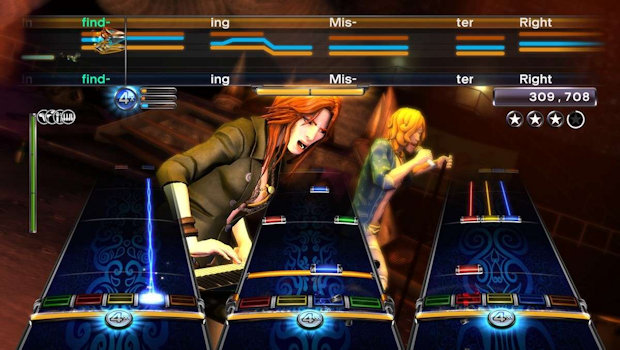For many gamers, plastic instrument focused rhythm games died off a few years ago. But then there was me, the guy who every couple months would invite his buddies over, grab a case of beer and run Rock Band nights until the wee hours of the morning. I never let go.
If you are like me and never moved on from your imaginary rock star persona, still have a place in your heart (and house) for a set of plastic instruments, and just want to be able to play Rock Band on your Xbox One or Playstation 4, then Harmonix has crafted a game for you. They call it Rock Band 4.
I’m not sure that Rock Band 4 is a good name for what Harmonix has released. Aside from bringing the Rock Band experience to new consoles, Rock Band 4 doesn’t do a whole lot else in terms of evolving the franchise. That isn’t to say that there aren’t some cool new features, but Rock Band 4 feels like a regression from Rock Band 3.
Rock Band 4 may be getting the band back together, but it isn’t your bad-ass super group anymore. This is a guitar, bass, drums, and vocals only affair. Support for keyboards, pro-guitar, and pro-bass are gone. So if you had a Rock Band 3 keyboard or one of the cool pro-guitar controllers, they are effectively non-functional plastic toys next to the new game. Rock Band 4 has the equivalent feel of a band that once played sold out arenas being forced to practice out of their garage.
Rock Band 4 plays like you expect a Rock Band game to play: playing guitar, bass, or drums, rainbow colored gems scroll down a highway and attempting to match those patterns using plastic instruments. Harmonix has added some twists on the formula, such as the awesomely fun freestyle guitar solos, but overall, Rock Band 4 plays like every other Rock Band (and Guitar Hero) before it. The act of playing the game is very much what you want out of Rock Band.
There is nothing wrong with going back to basics; you hear about musicians doing it all the time to re-focus themselves. Harmonix very clearly tries to approach Rock Band 4 from this perspective. The problem arises in the fact that those of us playing Rock Band aren’t actual musical artists. Rock Band is just a game to us and Rock Band 4 takes many of the features that we’ve come to expect from those games over the years, both from solo and party playing perspectives, and wholesale removes expected features or tries to re-write the standard.
Gone is the ability to customize your make-believe band. You can still customize your character, albeit with a more limited set of base options than prior entries, but the rest of your band has to be selected from Harmonix-created stand-ins. It may sound silly but this omission breaks some of the immersion that Rock Band normally provides.
Gone to is the ability to customize a set-list. In its place you can do one of two things, play songs on a one by one basis through quickplay or take part in the new Play a Show mode. Play a Show is the new “party” mode. If you are having a Rock Band night, you’ll all jack in with your instruments and hit Play a Show, where the game will allow the band to vote on what they want to play. Sometimes the vote is super specific like, “Play You’re Love by The Outfield” but most of the time it will be a bit more ambiguous like, “Play a Nu-Metal song” or “Play a song from 1979”. It’s not a bad mode and my friends and I had a blast with it for a good six hour play session, especially when screwing over whomever was on vocals by choosing something super against the grain. But even though the mode was fun, the question kept arising as to why couldn’t we just create a set list like we had in the past. I think if the option was there to make set-lists we would have eventually resorted to playing the old way.
It’s even worse for solo players though. Play a Show mode takes too much time between songs for it to be enjoyable from a solo perspective. And the fact that I own all the Bon Jovi songs available in Rock Band but I can’t just make a Bon Jovi set list, instead having to load in and out of each song from quick play, is a travesty worthy of me trashing a hotel room over.
Also gone are the super fun cut scenes that tied together your Rock Band 3 experience. And likewise, the robust challenge-based campaign that was present in Rock Band 3 is also no more. Instead Rock Band 4 presents something much similar to Rock Band 2’s career mode. You’ll create your character, name your band, and select your starting city. From there you’ll play shows with varying set-lists, some being pre-made, some chosen by you, and some voted on by your band. As you play these shows, you’ll gain stars which will unlock new cities to visit and bigger venues.
Getting stars also unlock special events called Tours. These tours are a handful of different shows with a theme based on what you chose for the tour. The very first choice you’ll make is between a van or a manager. Choosing the van allows you to gain more fans while also allowing you to choose which songs you play. Choosing the manager grants you more money but forces you to play pre-defined sets. There is a limited narrative through line for all of these choices and they are told through little text blurbs deposited at different times during the tour. The text blurbs are sometimes kind of funny but because of the lack of band customization and absence of visual aspect to the narrative, it all feels a little tacked on. And because of this, the career mode just feels like something to do instead of something you actively want to do.
That probably sounds like a lot of things missing, and it is. But thankfully, what saves Rock Band 4 from its minimalist approach is the fact that a large portion of the Rock Band DLC library has transferred over to the new consoles. If you owned a library of music in the past console generation, that library moves forward with you on the same family of consoles. If you’ve moved from Xbox 360 to Playstation 4, you are effectively shit out of luck, and that does suck, but if you haven’t jumped company lines, you’ll get a good portion of your library from the word go. The reclamation process isn’t the smoothest, although it does seem to be improving over time. Disc-based transfers haven’t been enabled yet but Harmonix indicates they are coming. Still the fact that Rock Band 4 has so much content is a great boon for the game.
The other thing saving Rock Band from itself is that it allows you to use a lot of your old plastic instrument controllers with the new game. Playstation players get the good side of this deal as Playstation 3 controllers work out of the box with Rock Band 4 on the Playstation 4 due to the Bluetooth controller interface.. Xbox owners will require a special Legacy adaptor (for an additional fee) that will allow Xbox 360 controllers to work with Rock Band 4 on the Xbox One. So if you have an army of plastic instruments from the last go round of rhythm games, they’ll work here and you’ll just need the game.
If you want new plastic instruments, and let’s be honest, if you are into Rock Band, you probably do, MadCatz has done an okay job with the hardware. The guitar feels a bit light and the drums feel a bit more stiff than I remember, but both feel good when using them. The instruments don’t come cheap however, pricing at a premium over where they were with Rock Band 3.
Ultimately the game feels a bit unfocused. It’s almost like one part of it just wants to just be the platform Harmonix always envisioned Rock Band to be but another part wants to offer what we expect out of a $60 game. The platform side seems like it is a winner, yet the game side is a bit less than what we’ve come to expect from a Rock Band disc. In the end though, the effort is still Rock Band at its core. If you like Rock Band and want that experience again, this won’t let you down. It is literally made for us.
This review was written with material provided by the publisher on the Xbox One console. For more on our review process, please read here.


